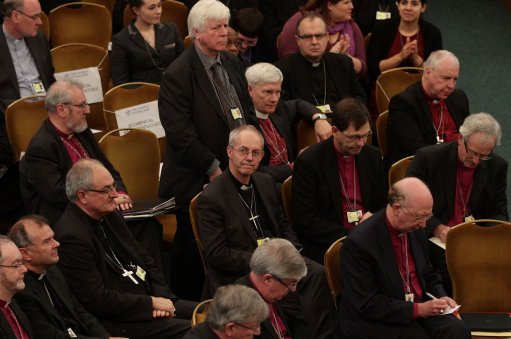'We do our arguing in public' – Isn't it time to stop?

In the week when the new Archbishop of Canterbury was enthroned, it was inevitable that there would be close analysis of his background, his attitudes, his views and the content of his sermons. In the course of my own reading, I came across one interesting comment made by Justin Welby that seems to have escaped much comment. He said, "The point about Anglicans, of course, is that unlike a number of other denominations, we tend to do our arguing in public; so it's rather more obvious."
Perhaps the reason that I found his comment so striking was because only the day after Justin Welby's enthronement, a national broadsheet newspaper featured an article written by a prominent Church of England vicar noted for his writing and broadcasting, which took a swipe at evangelicals. When you try and run someone else down, the tendency is to resort to crude generalisations, distortion, and patronising tones, and this article was no exception. But it entirely illustrated the new Archbishop's observation about Anglicans (dare I put it more broadly, and say Christians) conducting their arguments in public, and being somewhat derogatory and unpleasant in doing so.
The article in question was not published in an in-house church publication, but in a secular newspaper whose readership would largely be composed of non-churchgoing and unbelieving people. Is it any wonder that the Christian church is struggling to make an impact in the evangelising of our nation? Jesus indicated very clearly what was one of the most effective and powerful forms of witness: "By this all men will know that you are my disciples, if you love one another" (John 13:35). When the public encounter the exact opposite from those who claim his name, it is unsurprising that they are not interested.
The Archbishop spoke a truth that needs reinforcement again and again, when he said, "you don't have to agree to be in the same Church but you have to find ways in which we continue to love each other". Exactly. Perhaps a start could be made by not rubbishing others in the Church in front of an unbelieving world. William Barclay said: "More people have been brought into the church by the kindness of real Christian love than by all the theological arguments in the world. And more people have been driven from the church by the hardness and ugliness of so-called Christians than by all the doubts in the world."
Christians have a tendency to succumb to the very appealing temptation of labelling those they disagree with. Justin Welby has clearly encountered this. He stated, "I'd still describe myself as a conservative evangelical if I had to put a label on, but the trouble with the label is that it brings so much baggage." The reason for that is because labelling is one of the quickest and easiest methods of dismissing people. Labels very quickly become derogatory, and evangelicals are as adept at this as non-evangelicals. We are all guilty. Once we have pigeon-holed a person, we consider we no longer have to listen to what they say or engage with their viewpoints. The damage is incalculable.
Each year at this time Christians from some traditions have a practice of giving up something for Lent. Rather than giving up chocolate (no offence to those who have!), wouldn't it be wonderful if we could give up the practice of publicly criticising each other? You never know, rather than merely being a six week moratorium, it might just become a permanent habit! In the words of the Apostle John, "Since God so loved us, we also ought to love one another." (1 John 4:11)











